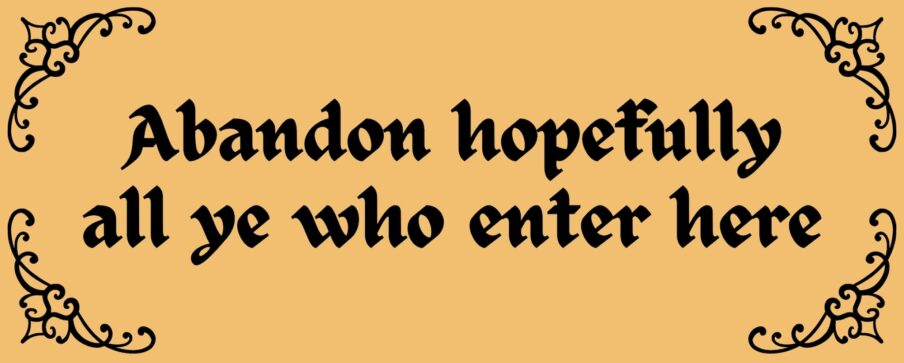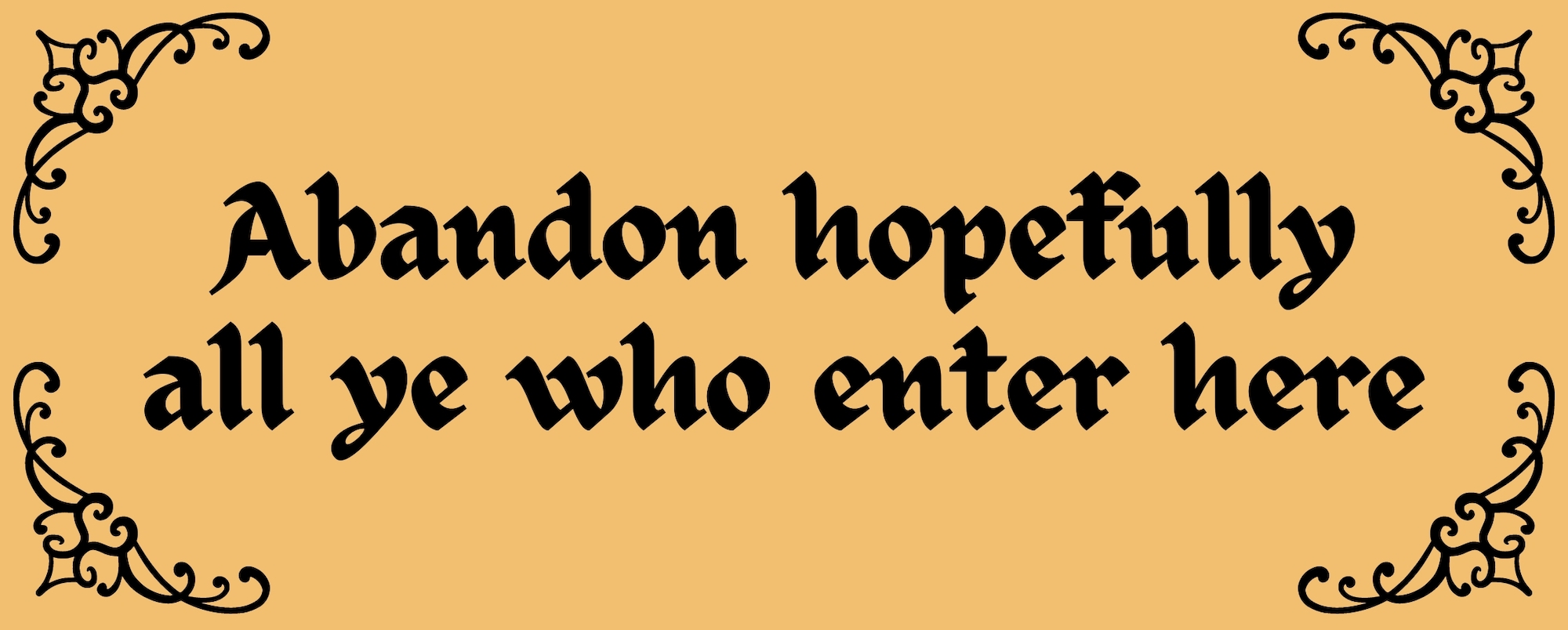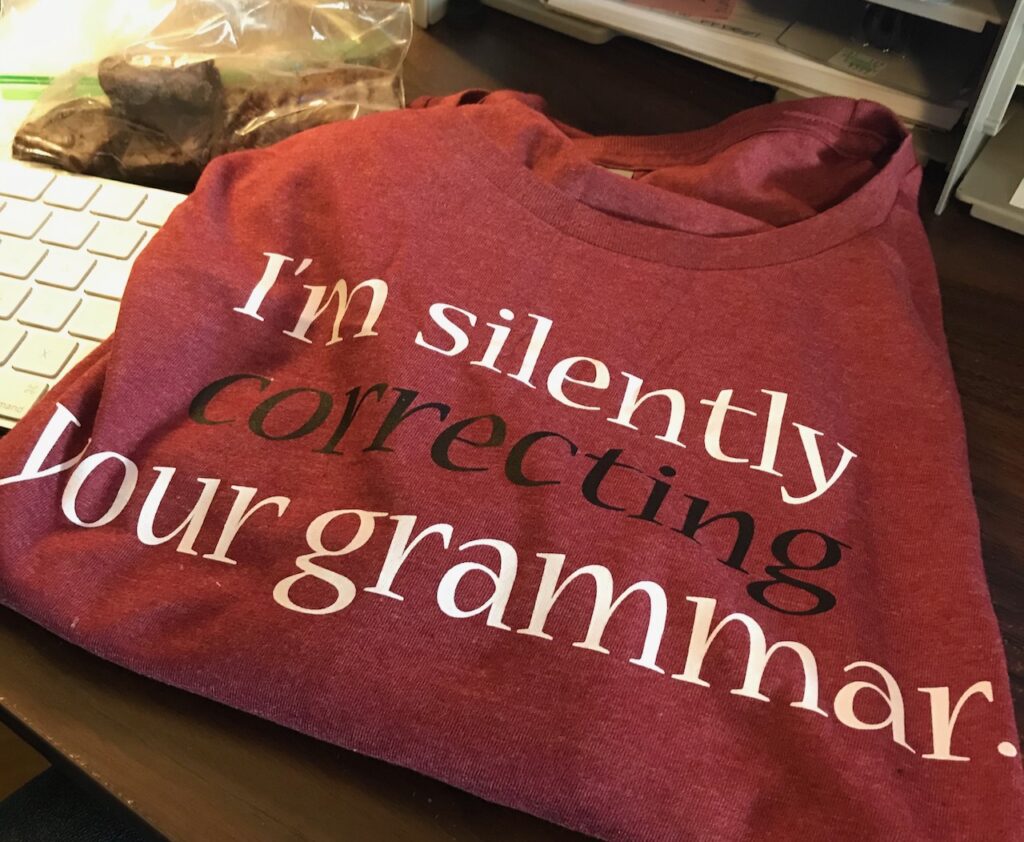By Suzy Taylor Oakley, @oakleysuzyt
One of the first things I noticed when I entered the newsroom at my college paper was a sign taped to the wall near our ancient computers:
Abandon hopefully all ye who enter here
For a long time, I thought it was a warning about all the hours we’d be putting in as angsty students trying to put out a twice-weekly paper while navigating the daily stresses of college life. (At the time, I wasn’t familiar with Dante’s famous line [see below]. Neither did I realize that the late, great NBC newsman Edwin Newman had this same sign in his New York office.)
I definitely felt the occasional wave of hopelessness as a frantically busy college student, but now I know that the newsroom sign wasn’t about me.
It was all about the grammar.
What’s wrong with the sentence, you ask hopefully? (wink, wink)
Let’s leave it there for a moment and use a more modern sentence that we might actually use in our prose:
Hopefully, the bus will arrive on time.
We’ve all said something like that, right? It’s how we talk.
What we mean is, “I hope the bus will arrive on time.”
But technically—and you know this if you’ve ever diagrammed sentences in English class—the original sentence conveys that the bus is hopeful. That big ol’ yellow thang will arrive with hope.
You see, hopeful is an adverb. Adverbs modify verbs.
And maybe you really did mean to convey that the bus was arriving full of hope. (In that case, you go, girl.) But that’s probably not how you meant it.
Many copy editors would cringe at the original sentence; thus the nitpicky “abandon hopefully” signs. But many copy editors would be fine with it. The latter would be in the “that’s how we talk” camp and make fun of the grammaristas (my preferred noun). Even more, they might not even notice it! Did you scratch your noggin when you read the headline? #WhatsTheFuss?
For better or worse, language changes as we use it. Purists (also known as language snobs or grammar nazis) want the world to adhere to a strict set of rules and never waver.
I consider myself a recovering grammar nazi. I’m a work in progress; thus I still love the T-shirt below, a Christmas gift from my writing accountability partner, Anna. (Her daughter’s homemade fudge was great, too.)
Even Anna had reservations about surprising me with the shirt. She was afraid I’d think she was calling me out for being a snob! (She’s not one, although she does know her Chicago Manual of Style.) I assured Anna that I had laughed as soon as I opened the package.

My point isn’t that we should straitjacket our writing so that it’s technically correct but prosaic and boring.
The goal with our words, especially in fiction, is to have a flow that draws readers into the story, not a collection of dry words and sentences that lulls them to sleep. We want them to forget where they are, to be transported seamlessly to our fictional town, world, or galaxy.
In my newspaper editing days, my goal was always clarity. Clarity over cleverness. We can do both, but clarity always comes first.
We should be conscious of our word choices and how they may affect the reader. Like this poor woman:
Here’s another example that makes my point even clearer:
Think about the word only. The placement of it can change the meaning of a sentence.
- Jim only eats burgers at a party.
Could mean Jim only eats the burgers (rather than eating and cooking them).
- Jim eats only burgers at a party.
Jim eats nothing but burgers at parties.
- Jim eats burgers only at a party.
The only time Jim eats burgers is when he’s at a party.
Hopefully you can think of other examples. (See what I did there? #RecoveringGrammarNazi.)
So, friend, it’s okay to break the rules, but first we must know what they are.
To serve our readers well, we must pay attention to the details. I urge you to spend some time thinking about that before you sit before your keyboard or notebook.
In Dante Alighieri’s classic work Inferno, the original quote reads, “Abandon all hope, ye who enter here.” The sign was etched above the gates of hell.
Suzy Taylor Oakley is a writer, editor and web developer who helps fellow authors build and grow an audience while sharing the good news of Jesus through their writing. Your gift for joining the wait list for Suzy’s WordPress course is her Author Website Checklist.
Suzy Taylor Oakley is a writer, editor and web developer who helps fellow authors build and grow an audience while sharing the good news of Jesus through their writing. Your gift for joining the wait list for Suzy’s WordPress course is her Author Website Checklist.




